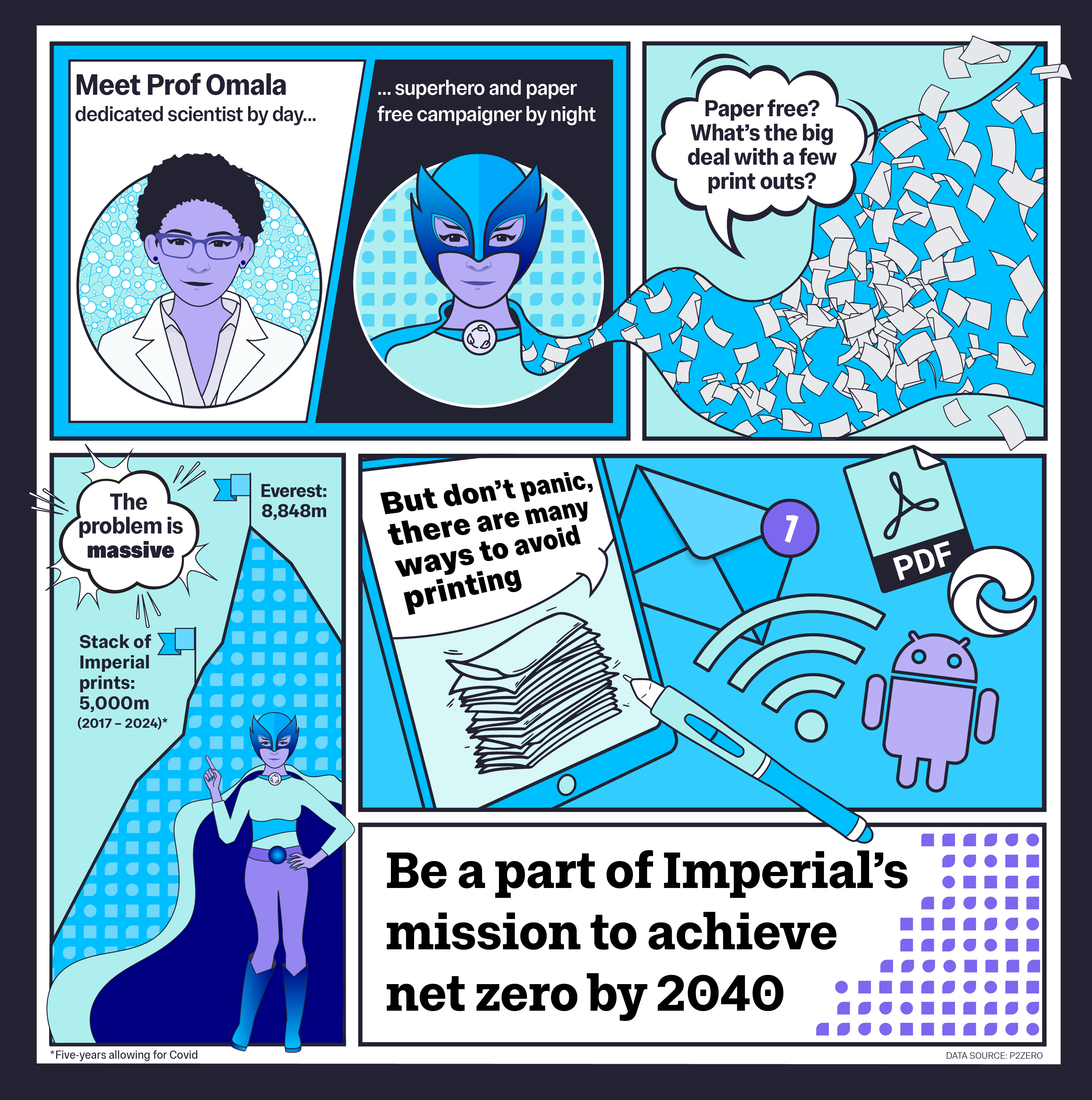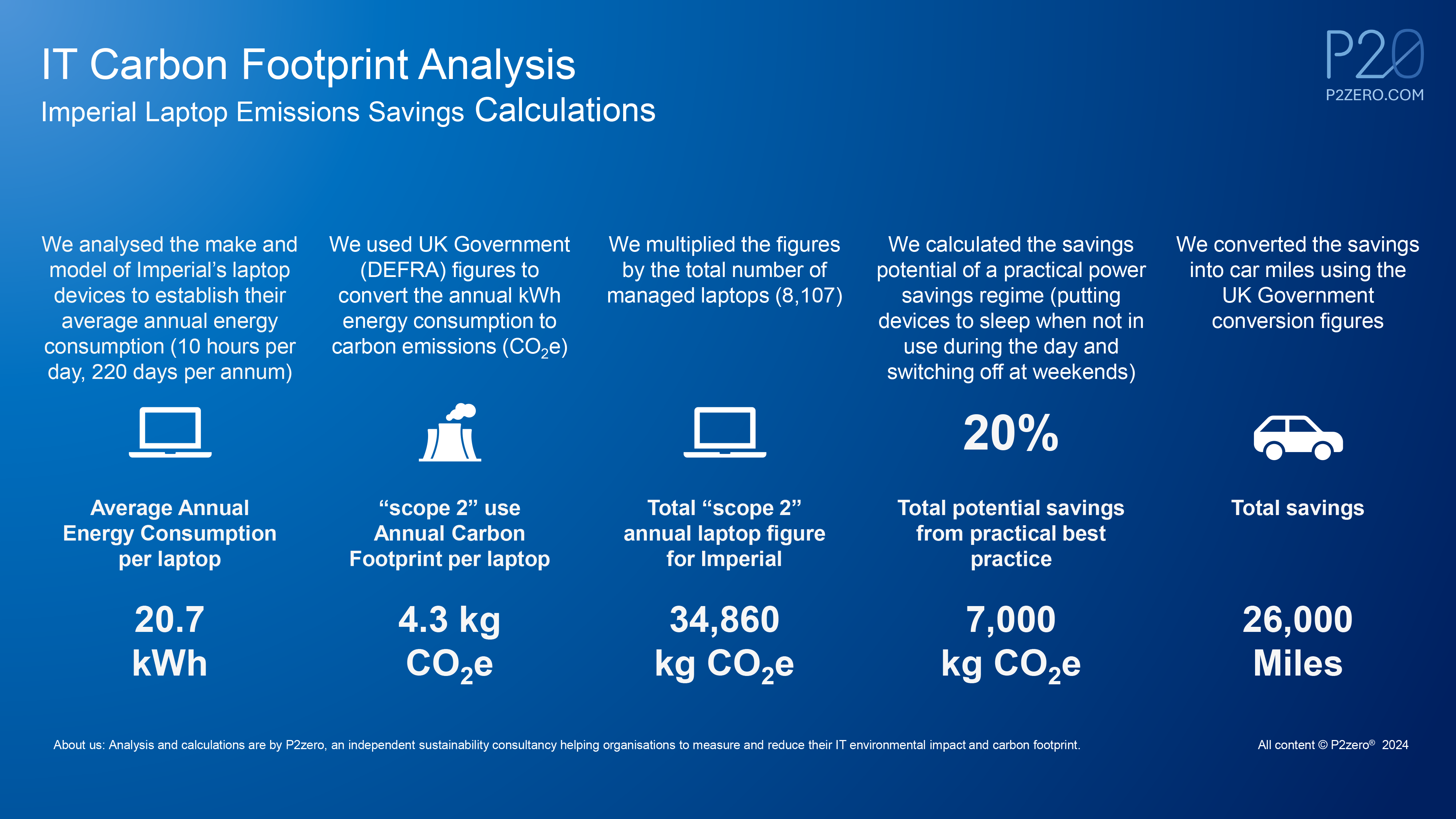Join us in our mission to reach net zero by 2040.
ICT are committed to Imperial's target of reaching net zero for Scope 1 and 2 emissions (energy and campus transport) by 2040 and minimising Scope 3 emissions (goods and services we buy) as far as possible. As part of this, we are making changes to ensure we can get there
By following these easy steps you can become your own sustainability superhero!
 Think before you print
Think before you print
To summit up! – In 5 years, the Imperial community printed over 50 million pages, that’s enough paper to reach Everest Basecamp!
We need your help – you can reduce your paper mountain by using technology instead of paper for many tasks, like taking notes!
Go paper free - do you really need to print your lecture notes? Why not try electronic note taking, like using Onenote instead.
How much does your department print?
Printers at Imperial
The current managed print service was put in place over five years ago, we can now see that printing volumes are far lower than in the early days of the contract. This is due to fewer people onsite since Covid and an increasing acceptance to only print when really needed.
As such, we are reviewing printer needs around Imperial which ties in with our 'Think before you print' sustainability campaign. Along with commercial aspects of the contract renewal, we’ll be reviewing the number of printers we have at Imperial, how often they are used and whether we can reduce their energy footprint.
As printers are left on throughout the year energy is used even if printing output is low, so focusing usage on a smaller number of devices will have a positive impact on our energy use. We can also see that in many locations around campus there are multiple printers with very little usage, we all need to think about how close we really need to be to a printer and to consider sharing with departments in the same area.
Shut the lid to save the grid!
Driven by a bold mission to achieve net zero by 2040 the ICT team are fighting to reduce Imperial’s carbon footprint by lowering energy usage that we get from the National Grid.

We need your help! By putting your laptop or computer to sleep when you go for a break, or switching off and unplugging it when not in use, you can save about 1kg of CO₂e per year!
Imagine if everyone at Imperial did that, we could save 7 tonnes of CO₂e – that’s the same as the average car driving around the entire globe!

The above infogram shows ICT's calculations for Imperial managed laptop emissions, as:
- The average annual energy consumption of one laptop is 20.7 kWh, which is equal to 4.3 kg CO₂e
- Therefore all 8,107 Imperial managed laptops create 34,860 kg CO₂e
- We calculated the savings potential of a practical power saving regime (i.e. putting devices to sleep wen not in use during the day and switching off at weekends) to be 20%;
- And therefore, total potetnial savings from practical best practice is 7,000 kg CO₂e
- We converted the savings into car miles using the UK Government conversion figures - the total savingss were 26,000 miles
How can you help?
You can reduce the amount of carbon you generate whilst working by:
- Turning your computer to standby when you aren’t using it, even if it’s just for 5 minutes, means your device uses 1 watt of electricity vs. 25 watts at idle (for a new standard desktop PC).
- When you leave for the day, as well as turning your computer to standby, turn your monitors and local printers off too (don’t switch off network printers as they manage their own usage). Even on standby, devices use electricity and over time, that can amount to a lot of wasted energy.
- Where you do intensive research, consider scheduling it so that the computer, where possible, can automatically go to sleep once the work is complete
Donate devices
Imperial is signed up to the SocialBox.Biz Scholarships for Refugees and Homeless People campaign, hallmarking the organisation’s dedication to societal engagement, inclusion and with the added benefit of reducing environmental pollution.
When you donate, old, but still usable technology to this scheme the device will be cleared of any sensitive data by ICT, open-source software will be installed on it by ScoialBox, and suitable items will be donated to refugees and homeless people to reuse in their learning.
What and how can you donate?
If you are doing a home or office clear out, please give us your old, but still usable:
- Computers and laptops (i5 processors and above)
- Smartphones
- iPads
- Servers
- Routers
- Don’t forget to disable any face ID or PINs from your devices before you donate, and include power leads.
You can donate personal devices (non-university items), but it is your responsibility to wipe them or back up data from any hard drives.
It’s really easy to donate, you can drop your items to ICT or they can collect from your office – just complete this ASK form. Full details of where to drop your items can be found on the form.
Other ways to recycle your university device
Disposal is an important factor in the life of a device. If this is not completed properly, and without the right checks in place, items sent to be recycled are often disposed of in less than ethical ways.
We are working with suppliers that guarantee zero to landfill recycling. To achieve this, they commit to using components from Imperial devices in other appliances and devices, creating a circular economy.
We ask you to join us in using our preferred supplier for device recycling.
An added benefit is that, depending on the device age and condition, value can be taken out and reinvested into newer devices.
Further reading
You can find out about the Impact technology has on the environment.